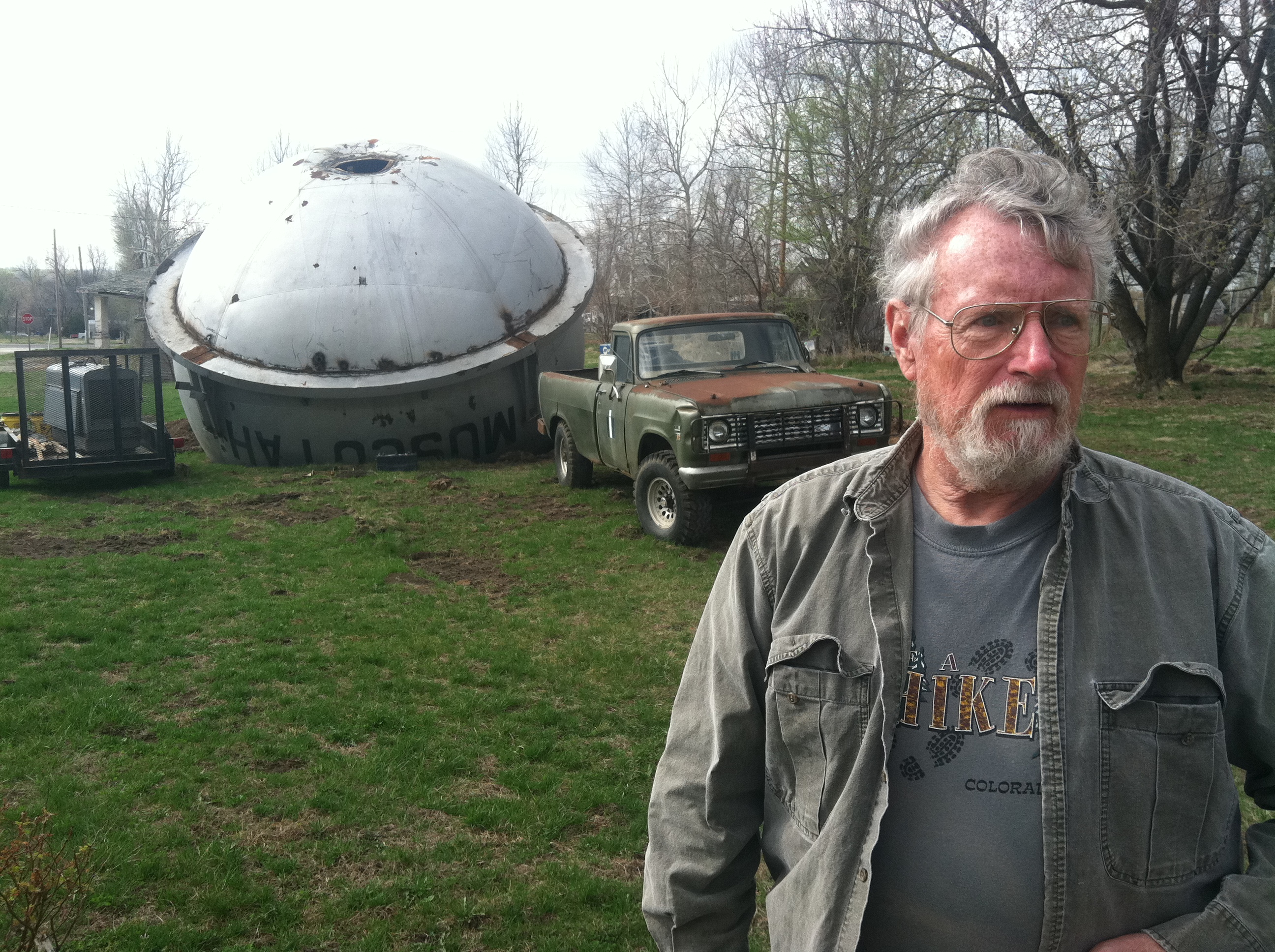If he builds it, will they come? Muscotah plans baseball museum

Muscotah, Kan., man Jeff Hanson is working to make the town's old water tower into a baseball museum honoring Baseball Hall of Famer Joe Tinker, who was born in the town in 1880. Hanson, 69, is also hoping a museum would bring much needed business to Muscotah.
Muscotah ? There isn’t much left of the town of Muscotah — population less than 180 — about 20 miles north of Valley Falls in Atchison County.
Abandoned and dilapidated houses and trailers dot Muscotah’s four or so blocks. Muscotah’s one school closed two decades ago, and the only operating business is the Muscotah Mercantile, a small general store opened in 2010.
The city’s welcome sign on Kansas Highway 159 is crooked, facing downward.
But local man Jeff Hanson, 69, sees potential for the town.
“We’re on a comeback,” says Hanson, as his three-legged dog, Lucky, hops around the storage tank of the city’s old water tower, plopped down in the middle of Muscotah like a crashed — and then abandoned — spherical spaceship.
In Hanson’s eyes, the hunk of metal — 22 feet in diameter — will soon be the world’s biggest baseball. Or at least Hanson believes so.
Donations
Those interested in donating to the Joe Tinker Museum can send checks to 1926 278 Road, Muscotah, Kan., 66058. Make checks payable to the city of Muscotah and designate it for the Tinker Museum.
‘Tinkers to Evers to Chance’
These are the saddest of possible words:
“Tinker to Evers to Chance.”
Trio of bear cubs, and fleeter than birds,
Tinker and Evers and Chance.
Ruthlessly pricking our gonfalon bubble,
Making a Giant hit into a double —
Words that are heavy with nothing but trouble:
“Tinker to Evers to Chance.”
— By Franklin Pierce Adams, New York Evening Mail, July 10, 1910

Early 20th Century Chicago Cubs players, from left, Joe Tinker, Johnny Evers and Frank Chance. The trio was well-known for their double-play abilities, with Tinker playing shortstop, Evers second base, and Chance first base. The three were also the subject of a well-known Franklin Pierce Adams 1910 poem Tinker
“Until someone proves different,” he says.
Hanson’s on an unusual and ambitious mission in Muscotah: revive the city by turning the water tank into a baseball museum honoring the town’s most famous resident, National Baseball Hall of Famer Joe Tinker. For most of his career, Tinker played shortstop for the Chicago Orphans/Cubs between 1902 and 1916 and won two World Series, including the Cubs’ last world championship in 1908.
He was part of the famous Tinker to Evers to Chance double play combination, immortalized in the 1910 poem by Franklin Pierce Adams of the New York Evening Mail. Tinker, Johnny Evers and Frank Chance were voted into the Hall of Fame as a unit in 1946.
“We’re hoping this is the beginning of a new Muscotah,” Hanson says.
The project
Muscotah residents, about a decade ago, learned Tinker, who died in 1948, was born in Muscotah in 1880. Once the information was out, “we more or less adopted him as our calling card,” Hanson says.
The chips for the project fell into place after Hanson heard someone remark that the town’s water tower looked like a baseball.
A grant paid for construction of new a water tower, meaning the old one, which overlooks the town’s only baseball field, now named Joe Tinker Field, would be taken down.
“I’d like to have that ball on the ground” in one piece, Hanson told the construction contractor. “Everybody said it couldn’t be done.”
Instead of dismantling the storage tank, workers managed to pull it down, denting the dome on one side. No problem, that’ll be the floor, Hanson says.
Donations for the project have been coming in, and they now have about $1,000 to complete Phase One, which entails painting the ball white with red laces. Phase Two calls for insulating the dome, adding a door and making the inside suitable for visitors. During Phase Three, the final phase, Hanson says, they’ll add baseball memorabilia and Muscotah historical artifacts. Hanson’s planning for an unveiling during Muscotah’s annual Rose Festival in June.
Hanson says they’ve been getting donations for the museum from across the state.
Some lifeblood
Across town, Hanson says, the idea has been well-received.
“Most of them think it’s a fun project,” Hanson says. “There’s only one person who’s said, ‘It’s not worth it.'”
Hanson, a retired carpenter, is new to Muscotah, moving here five years ago with his wife, C.J., who grew up here. They came back to the area to help care for elderly family members.
The couple describe themselves as “civic-minded” and wanted to do something to revive the town that used to bustle with a cafe, several banks and a feed store, says C.J., describing the town she grew up in during the 1950s and ’60s.
When they came back, everything was gone.
So C.J., with several other Muscotah residents, opened the Mercantile in a converted home near the town’s main road. The store offers a variety of goods, from cereal to holiday knickknacks. On Saturdays, C.J. bakes cinnamon rolls, and people gather in front of the store for conversation.
The Joe Tinker Museum could be the start of more such places, Hanson says, drawing tourists and money to the faded Kansas town. Hanson points to a vacant piece of property on the highway and talks about a future bank or grocery store or cafe.
“That’s the idea,” Hanson says. “Some lifeblood in this community.”







